PLAN YOUR TRIP
The reserve is fairly isolated with the nearest village, San Gerardo de Rivas, 2.5 km (30 minute walk) away. The nearest large town is San Isidro del General, a 1-1.5 hour bus ride down the mountain. Click here for detailed directions to Cloudbridge.
Travel
Visas & Documents: You will need a passport to enter Costa Rica. Passports should be valid for at least six months beyond the dates of your trip. For most nationalities you can stay 180 days at a time on a tourist visa, but you should check with your consulate regarding visa requirements before travelling. Before entering Costa Rica you will be asked for proof of an onward ticket out of Costa Rica (e.g. plane ticket home). If you are staying longer than 6 months we will inform you of the current requirements for renewing your visa.
During your stay, the law requires that you carry your passport at all times, although a copy usually suffices. Keep a photocopy of all key documents, such as passport, driver’s license and credit cards, in a Ziploc deep in your backpack. Better still, scan them and send the images to yourself as an email attachment. Same with all credit card numbers and key telephone numbers.
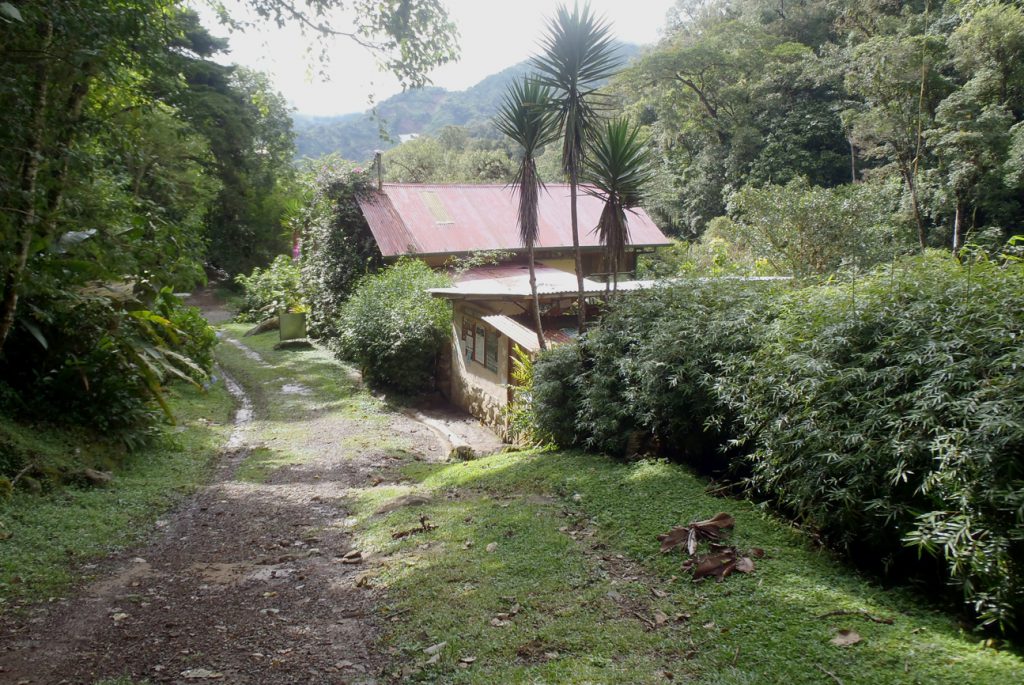
Safety While Traveling: Costa Rica is generally a very safe place to visit, although petty theft can be a problem in some places. When travelling around Costa Rica, it is wise to keep your valuables (money, passport, tickets, cameras, electronics, etc.) in a safe place on your person. Pickpockets are highly skilled, and the crowded bus terminals are golden opportunities for them. A couple of our volunteers have lost cameras and other valuables after setting bags down unattended in crowded places.
What To Bring
Clothing
Required Field Work/Volunteer Work Attire (To become stained and dirty. Quick dry fabrics are strongly recommended.):
- 2 long-sleeved lightweight shirts
- 3 short-sleeved lightweight shirts
- 2 pairs of long lightweight pants
- Hiking socks
- Hiking boots
- Rain jacket (Rain Poncho)
- Rain Pants (Optional)
- Hat
- First Aid Kit
- Water Bottle
- Daypack (Rucksack)
- Work Gloves (Optional)
- Rubber boots – (Optional: Good for the rainy season (Sept-Nov & Apr-June) and can be bought in San Isidro at the Cinco Menos department store.)
Other attire:
- Sweater (Jumper)
- 10+ pairs of underwear
- 2-3 changes of clothes to wear after work
- 1 outfit to wear in town or for special occasions
- Sandals or flip-flops
- Walking shoes, or sneakers (optional)
- Swimsuit
- Beach towel
Note: There is a ‘Free Bin’ of old clothes, rubber boots, and shoes left by previous volunteers which can be a good source of extra work clothes.
Incidentals
- First Aid Kit
- Personal medications (bring enough to last the duration of your stay)
- Mosquito repellent
- Flashlight (headlight best)
- Rechargeable batteries and charger
- Daypack
- Water bottle
- A couple personal entertainment items (eg. books, DVDs, digital movies, games, musical instruments)
- Notebook
- Compact Spanish dictionary
- Camera
- Binoculars
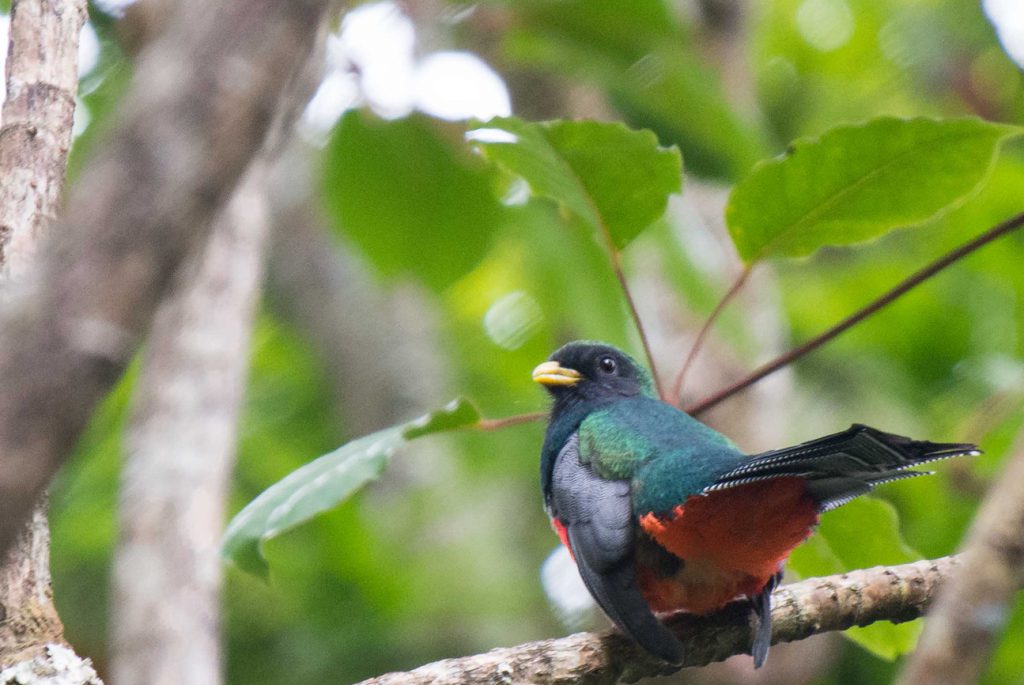
Money
Life is easiest in Costa Rica if you have cash (Costa Rican colones and US dollars), an ATM card, and a credit card (Visa is best). The closest ATM is in San Isidro, so make sure to stock up on cash while you are in town. Most local businesses in San Gerardo take Visa if you run out of cash.
Facilities
Accommodations
Most volunteers and researchers stay in one of our 6 dormitory rooms. Dormitory rooms are shared and hold between 4 to 8 people on bunk-beds; however our decided capacity is 16, therefore participants usually share a room with 1 to 3 other people, although it is dependant upon current occupancy. Private rooms may be available in the dormitories or one of our cabins for an additional fee (subject to availability). Bedding and towels are provided. All Cloudbridge buildings have electricity. See the Volunteer & Research page for current accommodation prices.
People staying in the dormitories share kitchen and bathroom facilities, located in and around the classroom. The kitchen is equipped with three gas stoves and two ovens, multiple refrigerators, microwave, and a variety of pots and pans and cooking utensils. There are four bathrooms with flush toilets, two of which have hot showers, and one with a cold shower. The classroom also serves as a common area and is equipped with tables, chairs, and couches; a small book exchange; a research library; and Wi-Fi. Outside, there are several hammocks to relax in.
Volunteers and researchers living in the dormitories are expected to keep their rooms clean and are responsible for following a daily cleaning rota for the common spaces and participating in a twice weekly cleaning event. Those staying in one of our other cabins have their own kitchen and bathroom facilities, but are welcome to use the common areas in the classroom, and are expected to take part in weekly cleaning events if they do so.
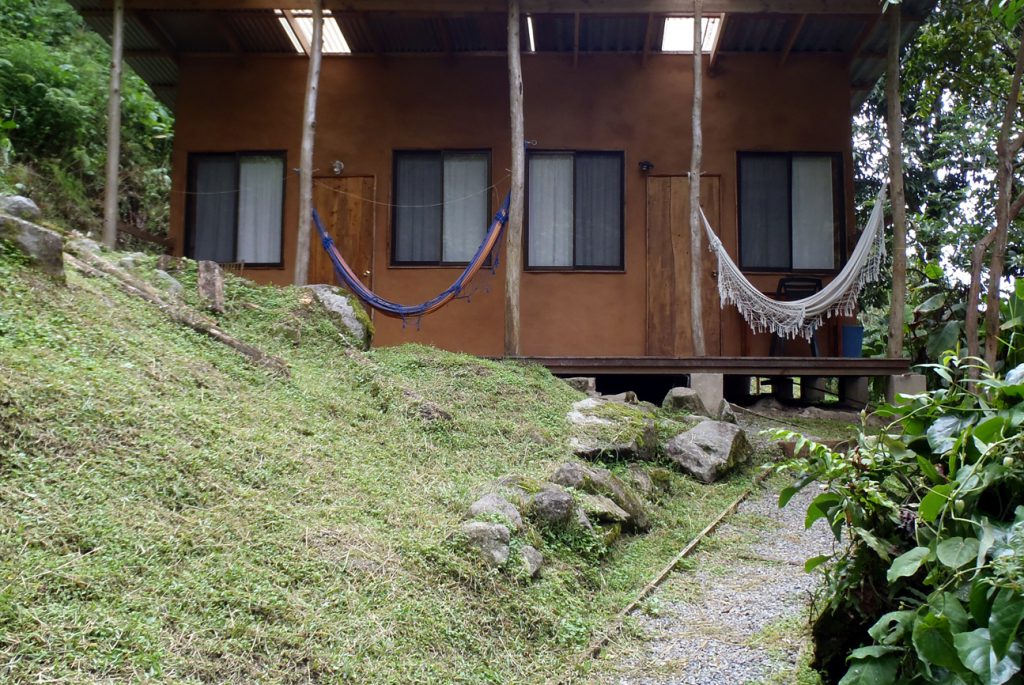
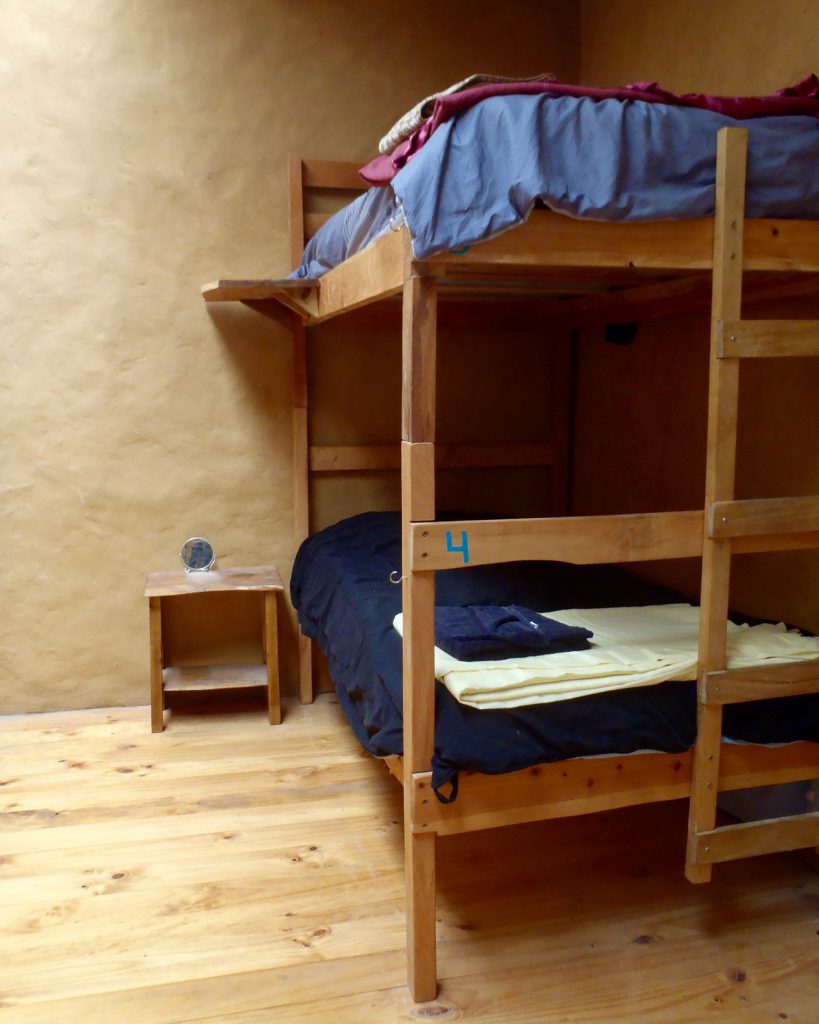
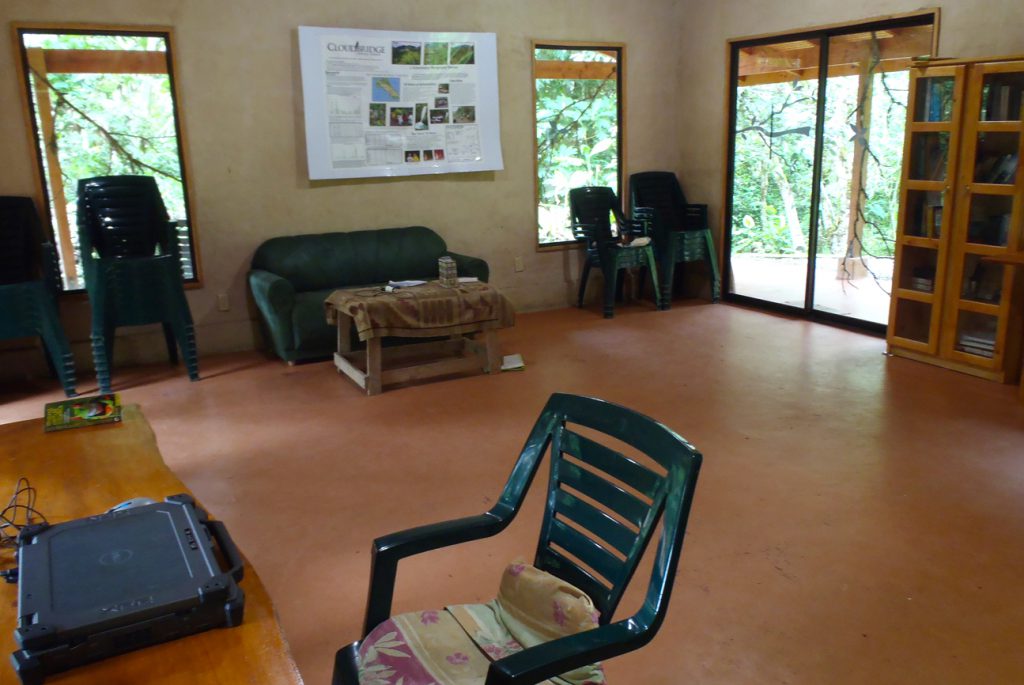
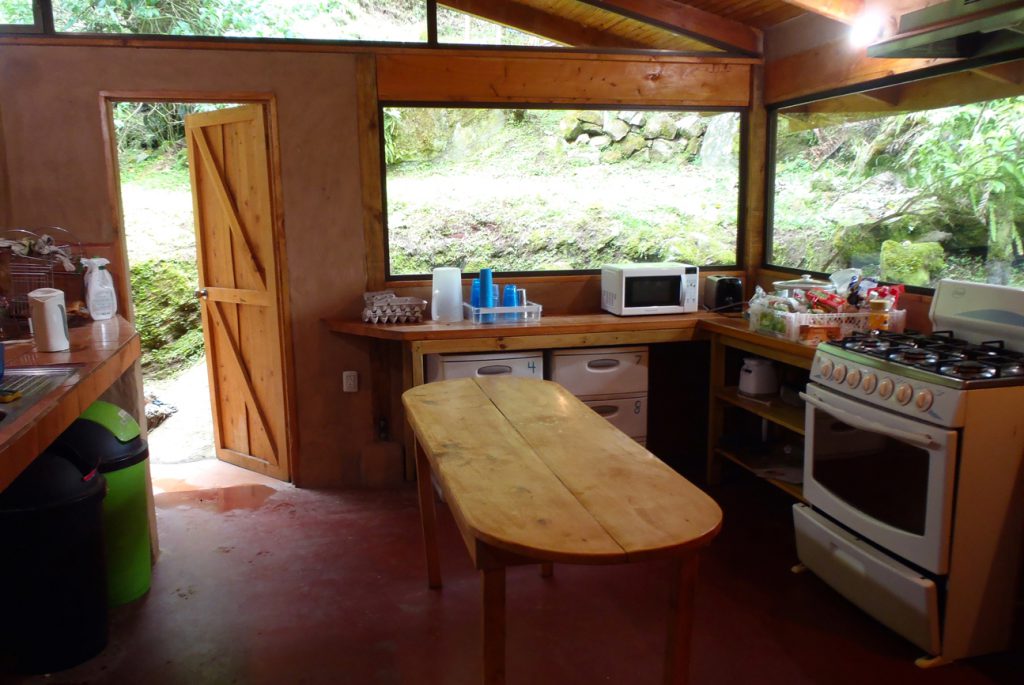
Laundry
Cloudbridge will wash bedding and towels once every 2 weeks, free of charge. Personal laundry can be washed and dried once a week for a cost of 3000 colones for a full load. Or, if you choose, you can hand-wash your clothes.
Drinking Water
The water at Cloudbridge comes from pure mountain springs with no treatment other than a filter. Most people have no issues with the water.
Food
Volunteers and researchers are responsible for their own food and cooking. Most people can find everything they need at the local pulperia and feria in San Gerardo. We encourage buying local for many reasons and provide the opportunity to buy from a local farmer’s market every Wednesday. Your food will be collected and brought up the mountain to the reserve. The Hotel Uran is a 15 minutes walk down the road, which hosts a restaurant and bar, and where a few groceries can also be purchased.
If you prefer a more exotic menu, San Isidro is a 1 to 1.5 hour bus ride away with multiple large grocery stores. If you have special dietary needs, you will want to stock up on any required specialty items (e.g. gluten-free flours) in San Isidro as San Gerardo has a limited selection (although lactose free milk is usually available). If you have specific questions about what foods are available in San Gerardo and San Isidro, please let us know and we will do our best to assist you.
There are several restaurants in the village of San Gerardo de Rivas (30 minute walk), as well as in the neighboring village, Canaan (1 hour walk, or accessible by a short bus ride).
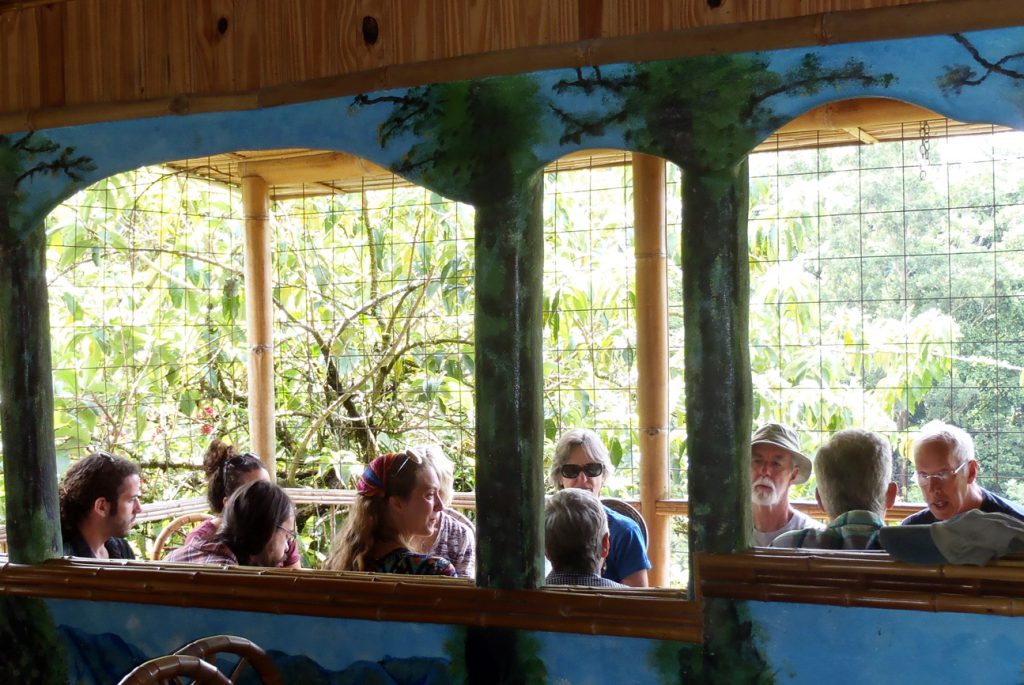
Communications
Wi-Fi is available in the classroom and in the cabins (except Gavilan), and there is limited connectivity in the dormitories. Independent researchers and research interns are highly encouraged to bring their own laptops for project work. If you don’t have your own computer, there is a Cloudbridge desktop available for work, but there is only one for everyone to share.
There are no phones at Cloudbridge. Cell phone reception is limited at the reserve and is usually only accessible from a few places. The nearest public phone is outside the Hotel Uran, a 10 minute walk from the reserve, which requires a phone card to operate. It is possible to use phone services likes WhatsApp, Skype, FaceTime, etc. through the Wi-Fi.
Stamps are available only at the post office in San Isidro.
Community
Who’s Here
The number of volunteers and researchers at the reserve fluctuates quite a bit, but a typical range is 8 to 16. We usually have more volunteers and researchers during the dry season and fewer in the wettest months (September through December). The usual stay is 4-12 weeks; although some have stayed for much longer. Volunteers and researchers come from all over the world (26 countries so far!), but typically from places like Germany, Canada, USA, France, the U.K., the Netherlands, and Australia.
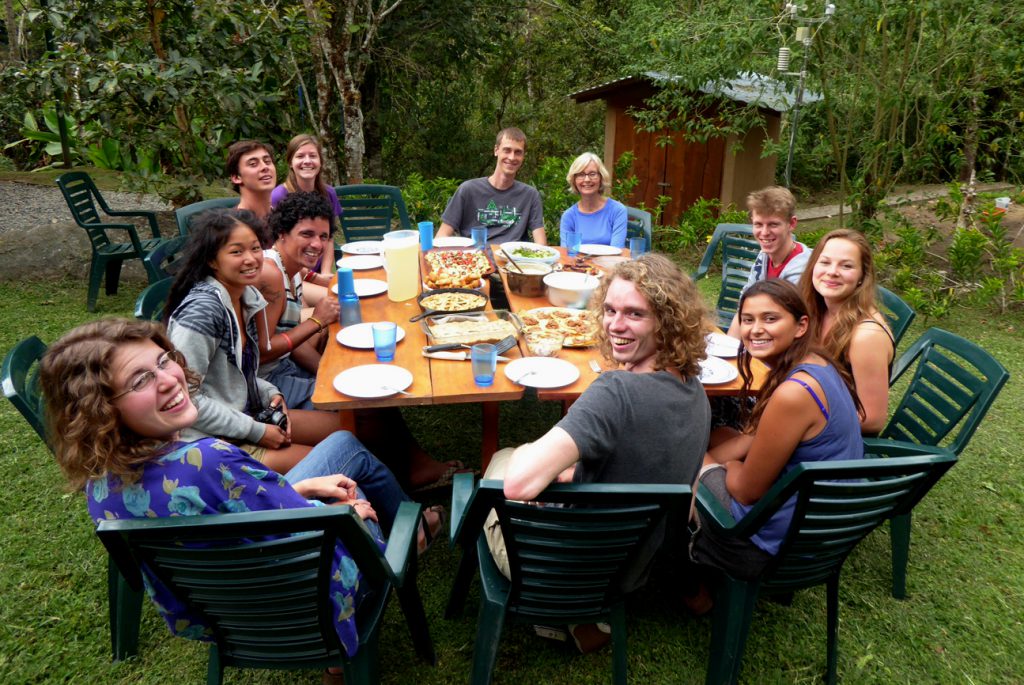
Language
The common language for most volunteers and researchers at Cloudbridge is English. However, most locals (Ticos) speak only Spanish, including several of the workers at Cloudbridge. A basic understanding of Spanish is useful and encouraged, but not required.
Spanish Lessons
If you are interested in learning some Spanish while you are here, Cloudbridge can put you in contact with a local teacher. Costs and schedule are discussed directly with the teacher.
Free Time Activities
Daytime
During the day, most of your time will be spent at the Cloudbridge Reserve. Within the reserve, you can explore the waterfalls, go for a hike, bird and animal watch, or swim in the cool river on a hot day.
Outside of the reserve, there are many other places to visit. You can walk down the road to the village of San Gerardo de Rivas for a meal, catch your own fish at the trout farm, or stop for a beer at the Roca Dura and chat to hikers and locals. Further down the mountain in Canaan, you can visit: the cheese shop, and pick up some locally made cheese and yogurt; the chocolate shop, for organic, hand-made chocolate; the butterfly dome, for both butterflies and gelato; or Batsu Gastropub, for a meal and some local beer and music. If you’re looking for a challenge, you can hike to the top of Mount Chirripó, Costa Rica’s tallest peak. There are also other beautiful hikes in the surrounding area. After a busy day, you can go to the nearby thermal springs to ease your muscles.
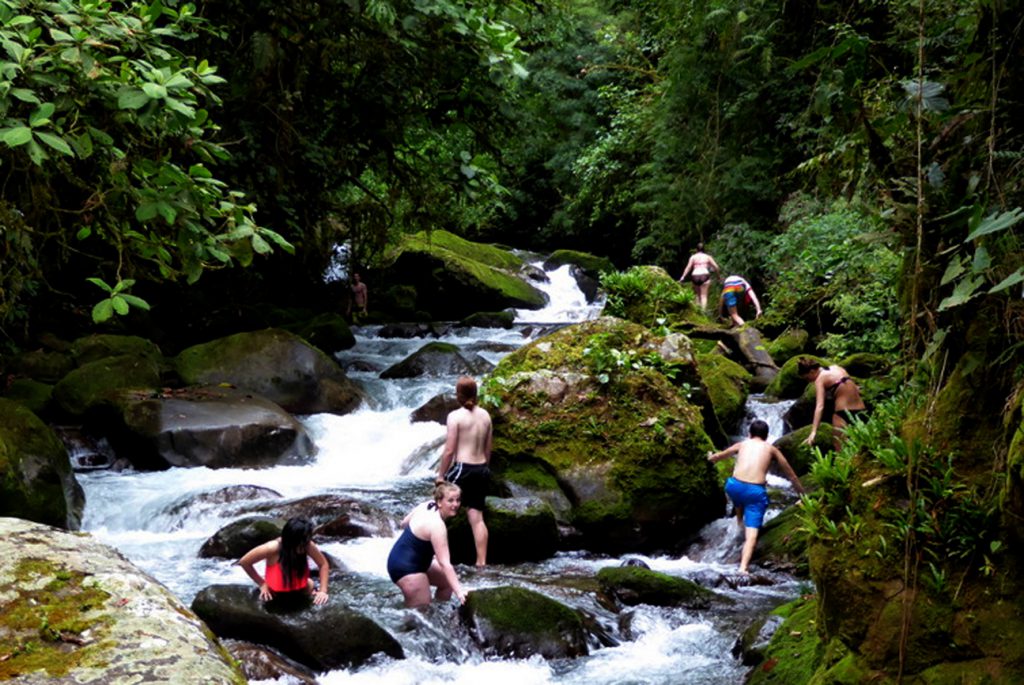
Evenings
Evening is one of the magical parts of life in the Chirripó Valley. After dinner, visitors often chat or write emails, play cards, read a novel, watch a movie, or study the nature books from the Cloudbridge library. All is done amidst the noise of the crickets and frogs and the rushing Chirripó River down below. On Thursday evenings we have a potluck (communal meal) in the classroom. We are generally in bed around 10 and awake about 6 to the dawn and the songs of the birds. Of course you can always have dinner or a drink at one of the local restaurants and meet new friends.
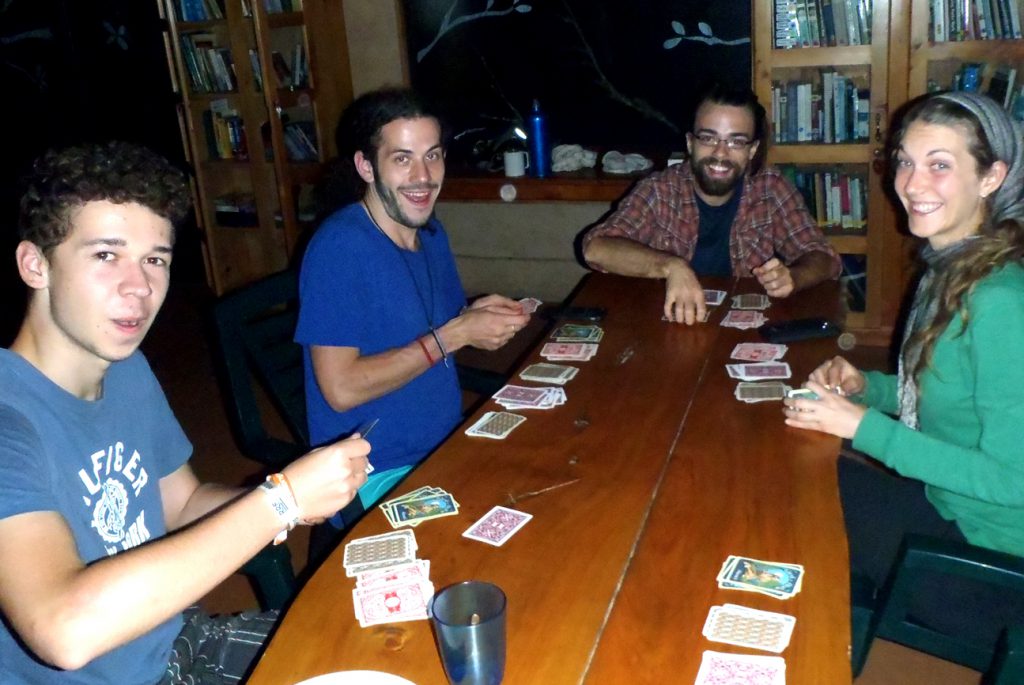
Weekends
On the weekends, many people will go on a trip to the beach or other destinations in Costa Rica. Popular weekend beach trips include: Dominical (about 2.5 hours), Uvita (about 3 hours), and Quepos/Manuel Antonio (about 3.5 hours).
Environment
Terrain
Cloudbridge is located in a steep mountain environment at an elevation of 1550-2600 m (5085-8530 ft). Getting to most places in the reserve requires walking up or down steep slopes or stairs. The steep terrain and high elevation can make it physically demanding for most people initially, especially in the first few days as you get accustomed to the thinner air. Bamboo sticks are provided for those who would like extra support for walking.
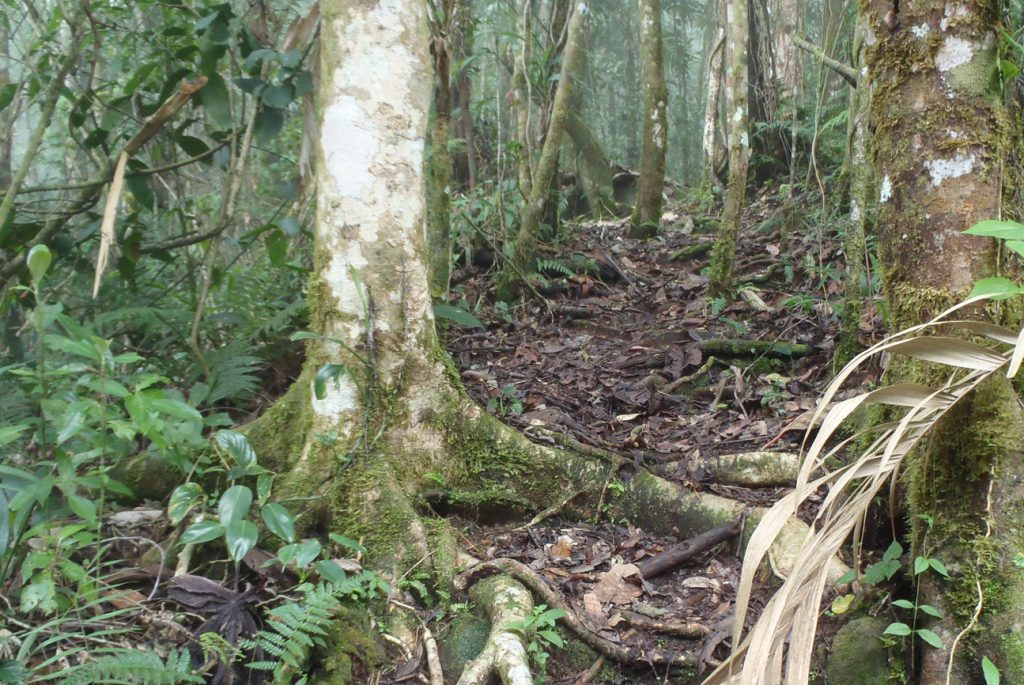
Weather
Temperatures at Cloudbridge are typically cooler than in much of Costa Rica and most people find the temperature quite pleasant. Daytime temperatures typically reach 25-30 °C (77-86 °F) in the afternoons, while nighttime temperatures range between 10-20 °C (50-68 °F).
Throughout the year, mornings are typically clear and sunny, and if it rains, it almost always rains in the late morning or afternoon. During the dry season (December through April), temperatures are usually a bit warmer and very little rain falls. In the rainy season (April through December), it rains in the afternoons almost every day for about 4 hours, starting any time from mid-day to early evening. For some people it gets really cold in the evenings, especially in the rainy season, so make sure to bring a few warm clothes.
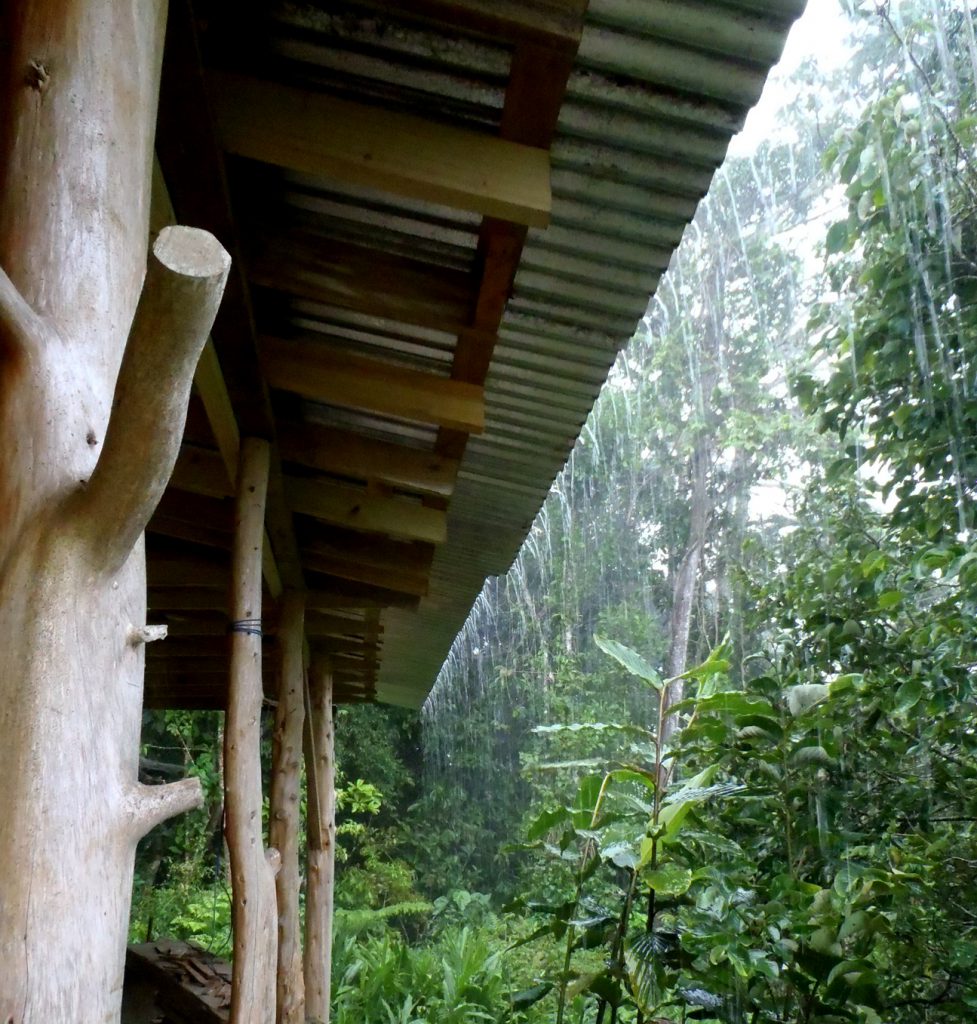
Snakes and Insects
There are fewer snakes and insects at this altitude compared to the rest of Costa Rica, but there are some. There are a few species of venomous snakes at Cloudbridge, however, they are shy and we have no records of anyone being bitten. There are mosquitoes and some other biting insects, such as chiggers and ticks, although none have bites that are life-threatening. Insect repellent is recommended if you are sensitive to insect bites.
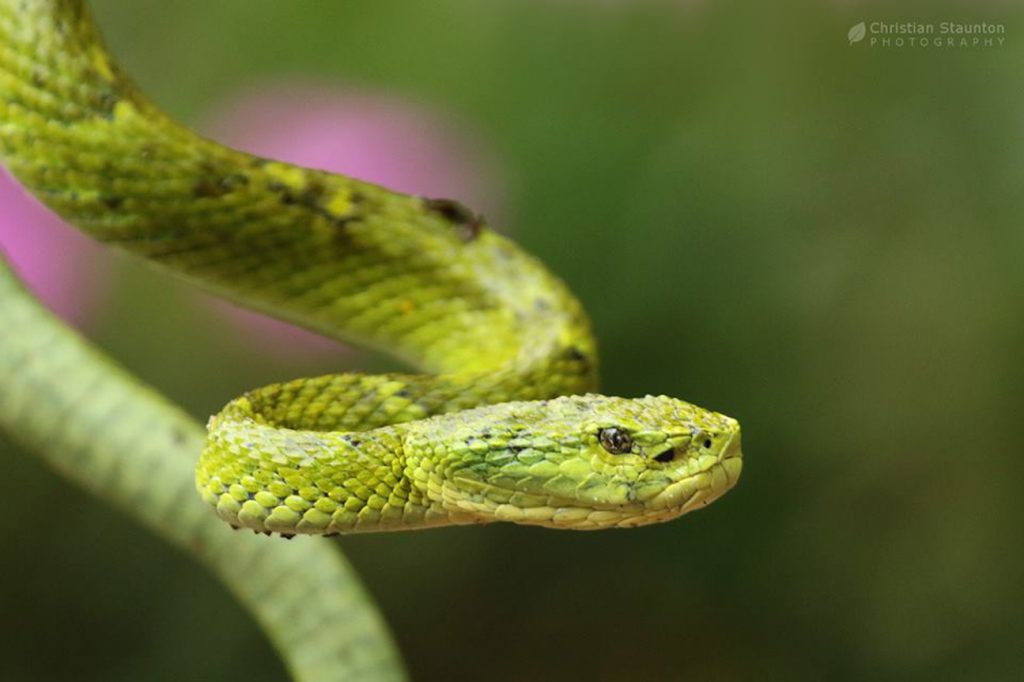
Staying Healthy
Tropical Diseases and Vaccinations
While very unlikely at this altitude, elsewhere in the country there have been cases of tropical diseases like malaria, dengue fever, and zika virus, although the risk is extremely low and no locals or Cloudbridge staff take preventative medications. No special vaccinations are required by Costa Rican law to enter the country at this time. However, you should consult your doctor regarding your medical needs, and check your country’s foreign affairs office for any necessary vaccinations before traveling.
Medical Care
Basic first-aid equipment is kept at the classroom. If someone needs professional medical help, there is a hospital and several medical clinics in San Isidro. More specialized medical facilities are located in San Jose. We recommend that you get travelers medical insurance in your home country as Cloudbridge does not cover medical costs.
Medications
Many over the counter or prescription medications readily available elsewhere are hard to find or expensive in Costa Rica. If there are any medications you need, or think you might want, make sure to bring an adequate supply to cover the duration of your stay. We recommend you bring diphenhydramine or another antihistamine in case you have an allergic reaction. An over the counter steroid cream for itches is also a good idea.
